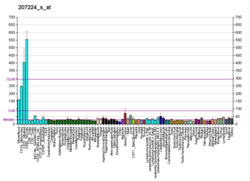SIGLEC7
| SIGLEC7 | |||||||||||||||||||||||||
|---|---|---|---|---|---|---|---|---|---|---|---|---|---|---|---|---|---|---|---|---|---|---|---|---|---|
 | |||||||||||||||||||||||||
| |||||||||||||||||||||||||
| Identifiers | |||||||||||||||||||||||||
| Aliases | SIGLEC7, AIRM1, CD328, CDw328, D-siglec, QA79, SIGLEC-7, SIGLEC19P, SIGLECP2, p75, p75/AIRM1, sialic acid binding Ig like lectin 7, AIRM-1 | ||||||||||||||||||||||||
| External IDs | OMIM: 604410 HomoloGene: 130668 GeneCards: SIGLEC7 | ||||||||||||||||||||||||
| |||||||||||||||||||||||||
| |||||||||||||||||||||||||
| |||||||||||||||||||||||||
| Orthologs | |||||||||||||||||||||||||
| Species | Human | Mouse | |||||||||||||||||||||||
| Entrez |
| ||||||||||||||||||||||||
| Ensembl |
| ||||||||||||||||||||||||
| UniProt |
| ||||||||||||||||||||||||
| RefSeq (mRNA) |
| ||||||||||||||||||||||||
| RefSeq (protein) |
| ||||||||||||||||||||||||
| Location (UCSC) | Chr 19: 51.14 – 51.15 Mb | n/a | |||||||||||||||||||||||
| PubMed search | [2] | n/a | |||||||||||||||||||||||
| Wikidata | |||||||||||||||||||||||||
| |||||||||||||||||||||||||
Sialic acid-binding Ig-like lectin 7 is a protein that in humans is encoded by the SIGLEC7 gene.[3][4] SIGLEC7 has also been designated as CD328 (cluster of differentiation 328).
References[]
- ^ a b c GRCh38: Ensembl release 89: ENSG00000168995 - Ensembl, May 2017
- ^ "Human PubMed Reference:". National Center for Biotechnology Information, U.S. National Library of Medicine.
- ^ Nicoll G, Ni J, Liu D, Klenerman P, Munday J, Dubock S, Mattei MG, Crocker PR (Dec 1999). "Identification and characterization of a novel siglec, siglec-7, expressed by human natural killer cells and monocytes". J Biol Chem. 274 (48): 34089–95. doi:10.1074/jbc.274.48.34089. PMID 10567377.
- ^ "Entrez Gene: SIGLEC7 sialic acid binding Ig-like lectin 7".
Further reading[]
- Reif K, Buday L, Downward J, Cantrell DA (1994). "SH3 domains of the adapter molecule Grb2 complex with two proteins in T cells: the guanine nucleotide exchange protein Sos and a 75-kDa protein that is a substrate for T cell antigen receptor-activated tyrosine kinases". J. Biol. Chem. 269 (19): 14081–7. doi:10.1016/S0021-9258(17)36757-1. PMID 8188688.
- Falco M, Biassoni R, Bottino C, et al. (1999). "Identification and molecular cloning of p75/AIRM1, a novel member of the sialoadhesin family that functions as an inhibitory receptor in human natural killer cells". J. Exp. Med. 190 (6): 793–802. doi:10.1084/jem.190.6.793. PMC 2195632. PMID 10499918.
- Ye X, Mehlen P, Rabizadeh S, et al. (1999). "TRAF family proteins interact with the common neurotrophin receptor and modulate apoptosis induction". J. Biol. Chem. 274 (42): 30202–8. doi:10.1074/jbc.274.42.30202. PMID 10514511.
- Vitale C, Romagnani C, Falco M, et al. (2000). "Engagement of p75/AIRM1 or CD33 inhibits the proliferation of normal or leukemic myeloid cells". Proc. Natl. Acad. Sci. U.S.A. 96 (26): 15091–6. doi:10.1073/pnas.96.26.15091. PMC 24778. PMID 10611343.
- Angata T, Varki A (2000). "Siglec-7: a sialic acid-binding lectin of the immunoglobulin superfamily". Glycobiology. 10 (4): 431–8. doi:10.1093/glycob/10.4.431. PMID 10764831.
- Ito A, Handa K, Withers DA, et al. (2001). "Binding specificity of siglec7 to disialogangliosides of renal cell carcinoma: possible role of disialogangliosides in tumor progression". FEBS Lett. 498 (1): 116–20. doi:10.1016/S0014-5793(01)02476-0. PMID 11389909. S2CID 6755832.
- Mingari MC, Vitale C, Romagnani C, et al. (2002). Regulation of myeloid cell proliferation and survival by p75/AIRM1 and CD33 surface receptors. Adv. Exp. Med. Biol. Advances in Experimental Medicine and Biology. Vol. 495. pp. 55–61. doi:10.1007/978-1-4615-0685-0_8. ISBN 978-1-4613-5194-8. PMID 11774609.
- Yousef GM, Ordon MH, Foussias G, Diamandis EP (2002). "Genomic organization of the siglec gene locus on chromosome 19q13.4 and cloning of two new siglec pseudogenes". Gene. 286 (2): 259–70. doi:10.1016/S0378-1119(02)00432-8. PMID 11943481.
- Alphey MS, Attrill H, Crocker PR, van Aalten DM (2003). "High resolution crystal structures of Siglec-7. Insights into ligand specificity in the Siglec family". J. Biol. Chem. 278 (5): 3372–7. doi:10.1074/jbc.M210602200. PMID 12438315.
- Strausberg RL, Feingold EA, Grouse LH, et al. (2003). "Generation and initial analysis of more than 15,000 full-length human and mouse cDNA sequences". Proc. Natl. Acad. Sci. U.S.A. 99 (26): 16899–903. doi:10.1073/pnas.242603899. PMC 139241. PMID 12477932.
- Nicoll G, Avril T, Lock K, et al. (2003). "Ganglioside GD3 expression on target cells can modulate NK cell cytotoxicity via siglec-7-dependent and -independent mechanisms". Eur. J. Immunol. 33 (6): 1642–8. doi:10.1002/eji.200323693. PMID 12778482. S2CID 7541832.
- Dimasi N, Moretta A, Moretta L, et al. (2004). "Structure of the saccharide-binding domain of the human natural killer cell inhibitory receptor p75/AIRM1". Acta Crystallogr. D. 60 (Pt 2): 401–3. doi:10.1107/S0907444903028439. PMID 14747738.
- Ikehara Y, Ikehara SK, Paulson JC (2004). "Negative regulation of T cell receptor signaling by Siglec-7 (p70/AIRM) and Siglec-9". J. Biol. Chem. 279 (41): 43117–25. doi:10.1074/jbc.M403538200. PMID 15292262.
- Avril T, Floyd H, Lopez F, et al. (2005). "The membrane-proximal immunoreceptor tyrosine-based inhibitory motif is critical for the inhibitory signaling mediated by Siglecs-7 and -9, CD33-related Siglecs expressed on human monocytes and NK cells". J. Immunol. 173 (11): 6841–9. doi:10.4049/jimmunol.173.11.6841. PMID 15557178.
- Yamaji T, Mitsuki M, Teranishi T, Hashimoto Y (2005). "Characterization of inhibitory signaling motifs of the natural killer cell receptor Siglec-7: attenuated recruitment of phosphatases by the receptor is attributed to two amino acids in the motifs". Glycobiology. 15 (7): 667–76. doi:10.1093/glycob/cwi048. PMID 15703304.
- Attrill H, Takazawa H, Witt S, et al. (2006). "The structure of siglec-7 in complex with sialosides: leads for rational structure-based inhibitor design". Biochem. J. 397 (2): 271–8. doi:10.1042/BJ20060103. PMC 1513286. PMID 16623661.
- Rapoport EM, Pazynina GV, Sablina MA, et al. (2006). "Probing sialic acid binding Ig-like lectins (siglecs) with sulfated oligosaccharides". Biochemistry Mosc. 71 (5): 496–504. doi:10.1134/S0006297906050051. PMID 16732727. S2CID 11537303.
- Biedermann B, Gil D, Bowen DT, Crocker PR (2007). "Analysis of the CD33-related siglec family reveals that Siglec-9 is an endocytic receptor expressed on subsets of acute myeloid leukemia cells and absent from normal hematopoietic progenitors". Leuk. Res. 31 (2): 211–20. doi:10.1016/j.leukres.2006.05.026. PMID 16828866.
External links[]
- SIGLEC7+protein,+human at the US National Library of Medicine Medical Subject Headings (MeSH)
This article incorporates text from the United States National Library of Medicine, which is in the public domain.
Categories:
- Genes on human chromosome 19
- Clusters of differentiation
- SIGLEC
- Membrane protein stubs










